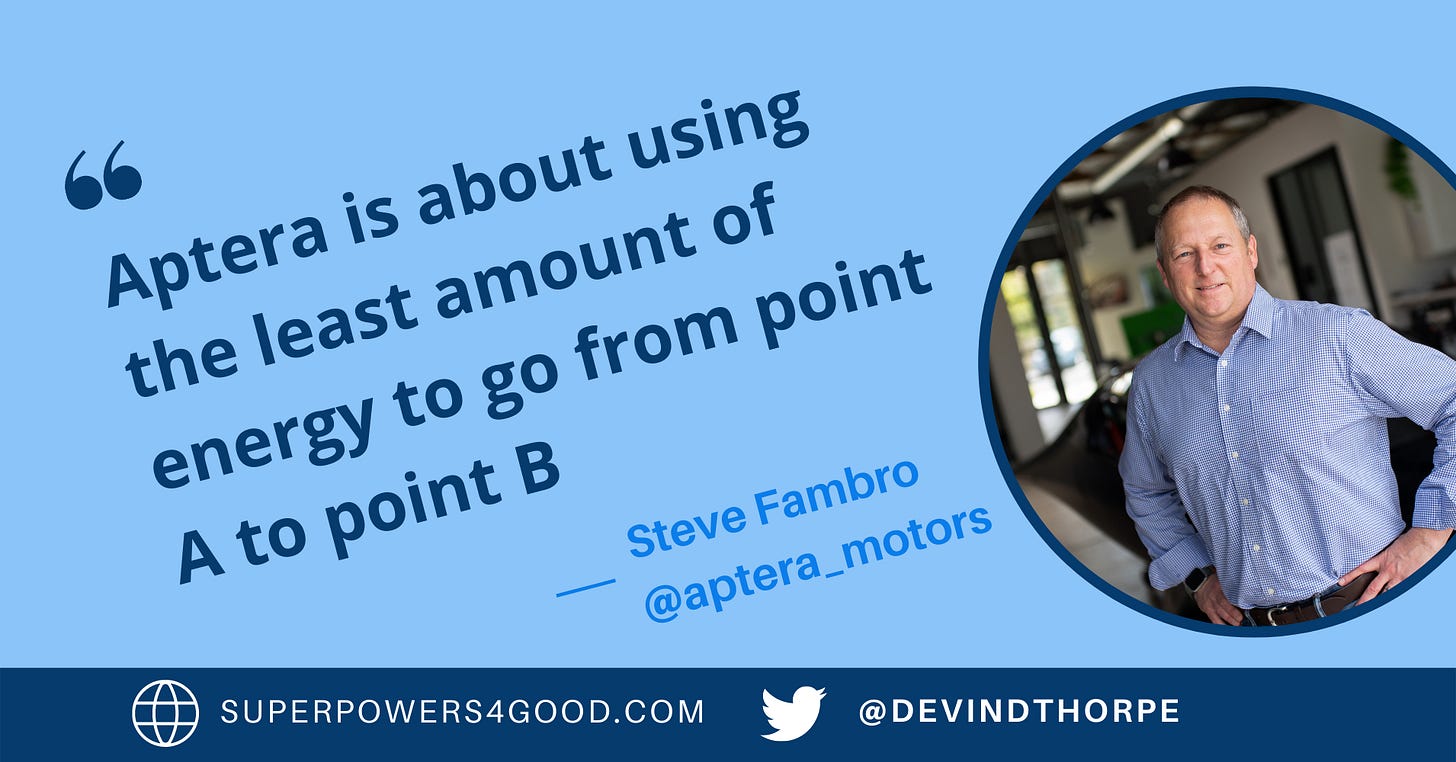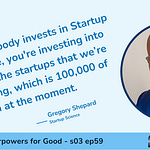Devin: What do you think of as your superpower?
Steve: I think it’s—my wife would say it’s my ability to close my eyes and sleep anywhere. I learned that from the army. But I would say something else I also learned from the army is the ability to deprive myself of any comfort, or sleep, or food or whatever is needed for as long as needed and without experiencing discomfort.
Aptera is building the EV I most want to own. (Full disclosure: I have not only pre-ordered one, but I’ve also invested a bit in the company.)
Typical buyers can operate the three-wheeled, solar-powered vehicles in ordinary circumstances without ever needing to plug in to charge. Never. The panels collect enough energy from the sun to power a typical commute, so there is no need to get any power from the grid or the solar panels on your home’s roof.
Co-CEO, Steve Fambro, joined me for a conversation I couldn’t have been more excited to have. “Aptera is about using the least amount of energy to go from point A to point B,” he explained.
The company has an official target in mind: move the car one mile using just 100 watts of energy. By comparison, my remarkably efficient Chevy Bolt uses about 240 watts per mile. This means that the Aptera should be more than twice as efficient as the most efficient EVs on the road today.
There are two aspects, Steve explains, to achieving that efficiency. The first is aerodynamics. The second is weight. “The solar is icing on the cake.”
“The first thing that people notice when they see the Aptera is the shape,” Steve says. “‘Why does it look that way?’ It was the answer to a question we asked quite a long time ago. ‘Well, what is what is the lowest drag shape that can surround two people side by side?’”
The journey began over 15 years ago when Steve and his partner Chris Anthony launched the Aptera business for the first time. With no EV industry in existence, the headwinds for the business were challenging. They raised about $40 million, hired professional management and went to work.
“About a year into that plan, we just had a very strong sense of misalignment—myself and Chris—with the professional team,” Steve says. “That misalignment resulted in our departure from the company.” Ultimately, the company filed for bankruptcy and closed.
Steve and Chris reunited after pursuing other business ventures independently (Steve in vertical farming and Chris in batteries).
“We got together when I moved back to the United States and said, you know, the Aptera with new batteries would go maybe up to a thousand miles if we could pack 100 kilowatt-hours in,” Steve says.
Recognizing that the market for EVs was maturing rapidly, they decided to try again. “We came to the conclusion that 2006-7-8 when we were first doing it, that was a learning experience—that was a warm-up,” Steve says.
The two worked out a business plan to get into production at a small scale as quickly as possible, hoping to produce 3,000 to 4,000 units per year. Then, they began taking reservations.
Before we could even realize it, we had exceeded the three thousand reservations, you know, like the first month or so and then it was 4,000, 5,000, 6,000, 7,000, 8,000. The first couple of days, you know, we had an alert on our phone whenever we get a new preorder. And it was just it was dinging all the time. Finally, we just turned that feature off because it was just paradoxically, intriguing and amazing, but also annoying to be alerted every time.
Recently, I shared a story about the Aptera and the founders’ appearance on “Jay Leno’s Garage,” the popular YouTube show. That was a key milestone for Steve, he says. They had been on the show with the first Aptera fifteen years earlier.
“For that show to happen again and for us to be on there, it was a feeling of humility and just recognizing it’s—to recognize how precious it is to get a second chance,” Steve says.
Production will begin this year. (Note that during the interview, recorded late last year, Steve and I refer to 2022 as “next year.”) Which month production may begin, Steve declined to say. “I’m not going to pin the company down publicly without having the buy-in from the team.”
Steve has used his superpower, learned in the military, his ability to deprive himself of comforts like food and sleep to complete a project, throughout his career, including at Aptera.
How to Develop Self-Deprivation As a Superpower
Steve learned to deprive himself of comforts for the sake of the mission during his service in the military. He discovered another related lesson about maintaining this ability more recently.
He explained that while working for the royal family in the middle east, he traveled extensively via first- and business-class. After returning to a coach flight, he found himself complaining. “It was really the first time I caught myself doing that. It was a touchpoint to say, wait a minute, watch for that behavior because you become accustomed to these luxuries and these things, and they are they’re not essential, and they’re not normal even.”
He suggests our modern world provides “positive feedback of hedonism” that requires “periodic self-deprivation” to keep yourself adequately grounded.
It may be challenging for most of us who didn’t serve in the military to master self-deprivation. There are some things, like camping and walking short errands we typically do in the car, we can do to deprive ourselves of luxuries we have long since stopped recognizing as such. Make a list of things you could deprive yourself of purely as an exercise to build this part of your character.
Following Steve’s example could help you develop a superpower to enable you to do more good in the world.













